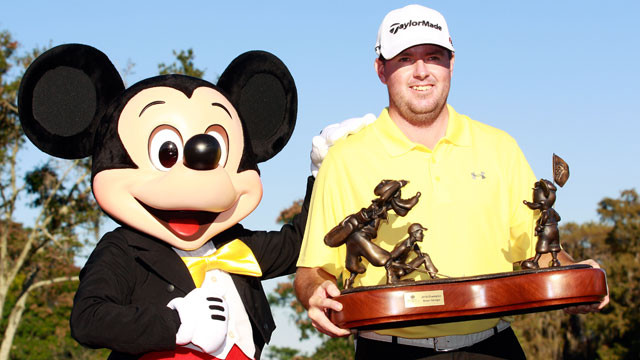NEWS
Garrigus wins at Disney, Thatcher is second, both keep PGA Tour cards
By Antonio Gonzalez
Published on

Robert Garrigus was on the final hole with a three-stroke lead. The gallery was lined up along the ropes. The cameras were focusing on his every move. The pressure was on.
Again.
This time he came through.
Garrigus shot an 8-under 64 to win the Children's Miracle Network Classic on Sunday, allowing him to keep his PGA Tour card and atoning for his colossal collapse earlier this year at Memphis. He finished at 21 under, three shots clear of Roland Thatcher for his first tour victory.
"It feels great to be able to close this one off and figuratively shut everybody up about Memphis," Garrigus said.
The victory was certainly sweet redemption.
He made triple bogey with a three-shot lead on the 72nd hole at Memphis, allowing Lee Westwood to win his only title this year -- a playoff victory that helped the Englishman go on to earn the world No. 1 ranking.
That loss was the only reason Garrigus was even at Disney.
He began the tournament 122nd in earnings and needed a solid finish to stay inside the top 125 -- the cutoff for full PGA Tour status. Dozens more were in the same situation.
Garrigus began the final round five strokes behind Thatcher -- who led everyone by at least four -- and put pressure on a player who needed an even stronger finish. Thatcher had to at least finish solo second or he was heading to qualifying school next week.
Thatcher imploded with three bogeys on the back nine, including on 16 and 17, when he badly misread putts. He got another chance to save his full status when Spencer Levin bogeyed the final hole, leaving his chip shot short and missing an 11-foot putt.
Then came Thatcher's last opportunity.
"I couldn't imagine having a more stressful moment in my life," Thatcher said.
He examined the green for a few minutes to analyze a pressure-packed par putt from 5 feet to keep his card. He looked over the putt, stepped back, then moved over it again. He struck the ball crisply and watched it roll in, barely pumping his fist and letting out a huge sigh in relief.
"You'll never see a happier guy who just vomited away a tournament," he said.
Several others also faced pressure to keep their tour cards.
But after all the jostling for the final spots, Thatcher joined Mark Wilson (123) and Michael Connell (115) as the only players this week to jump inside the top 125 after starting the week outside of it. Wilson was already exempt for next year with his win at Mayakoba in 2009. They bumped Troy Matteson, Woody Austin and Michael Allen.
Troy Merritt won the $1 million Kodak Challenge in a playoff with Rickie Fowler and Aaron Baddeley. The contest designates a hole at 30 tournaments and keeps score throughout the year.
"Emotions are all over the place," Merritt said.
Garrigus can relate.
In Memphis this year, he knocked his tee shot into the woods, then hit one off a tree -- when he probably should have just chipped out -- and eventually had a triple bogey. Then he bogeyed the first playoff hole.
It was a similar scenario this time around.
Garrigus' final tee shot found a patch of rough far left. Fortunately, the ball kicked back right, rolled onto the fringe and he eventually had an easier approach to save par. Earlier on the ninth hole, his tee shot also landed in a tree before trickling out for a clear shot to the green.
"I got lucky, and it hit a tree and came back in," Garrigus said. "And you got to have that to win. I really haven't had that yet."
Garrigus admitted his collapse at Memphis left him numb.
But he had been through far worse, overcoming a drug and alcohol addiction more than six years ago. Garrigus spent a month in rehab, gained 25 pounds to get his strength back and -- with a cleared head -- moved from the Nationwide Tour to the PGA Tour.
"So, I really don't care (about Memphis)," said Garrigus, who earned $846,000. "This is just golf. I have a family that loves me. It's easier for me to go out there and say, 'Hey, whatever.'
"If Memphis didn't happen, I don't know if this would have happened."
